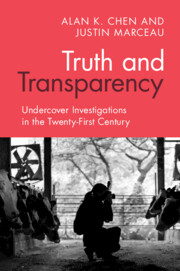11 results
4 - Free Speech Protections for Video Recordings
-
- Book:
- Truth and Transparency
- Published online:
- 17 August 2023
- Print publication:
- 31 August 2023, pp 134-185
-
- Chapter
- Export citation
5 - Undercover Investigations and New Technologies
-
- Book:
- Truth and Transparency
- Published online:
- 17 August 2023
- Print publication:
- 31 August 2023, pp 186-212
-
- Chapter
- Export citation
4 - Free Speech Protections for Video Recordings
-
- Book:
- Truth and Transparency
- Published online:
- 17 August 2023
- Print publication:
- 31 August 2023, pp 134-185
-
- Chapter
- Export citation
1 - An Overview of Undercover Investigations in Journalism and Political Activism
-
- Book:
- Truth and Transparency
- Published online:
- 17 August 2023
- Print publication:
- 31 August 2023, pp 1-35
-
- Chapter
- Export citation
5 - Undercover Investigations and New Technologies
-
- Book:
- Truth and Transparency
- Published online:
- 17 August 2023
- Print publication:
- 31 August 2023, pp 186-212
-
- Chapter
- Export citation
3 - Investigative Deception and the First Amendment
-
- Book:
- Truth and Transparency
- Published online:
- 17 August 2023
- Print publication:
- 31 August 2023, pp 75-133
-
- Chapter
- Export citation
2 - Evolving Journalistic Ethical Standards Regarding Undercover Investigations
-
- Book:
- Truth and Transparency
- Published online:
- 17 August 2023
- Print publication:
- 31 August 2023, pp 36-74
-
- Chapter
- Export citation
3 - Investigative Deception and the First Amendment
-
- Book:
- Truth and Transparency
- Published online:
- 17 August 2023
- Print publication:
- 31 August 2023, pp 75-133
-
- Chapter
- Export citation
1 - An Overview of Undercover Investigations in Journalism and Political Activism
-
- Book:
- Truth and Transparency
- Published online:
- 17 August 2023
- Print publication:
- 31 August 2023, pp 1-35
-
- Chapter
- Export citation
2 - Evolving Journalistic Ethical Standards Regarding Undercover Investigations
-
- Book:
- Truth and Transparency
- Published online:
- 17 August 2023
- Print publication:
- 31 August 2023, pp 36-74
-
- Chapter
- Export citation

Truth and Transparency
- Undercover Investigations in the Twenty-First Century
-
- Published online:
- 17 August 2023
- Print publication:
- 31 August 2023

